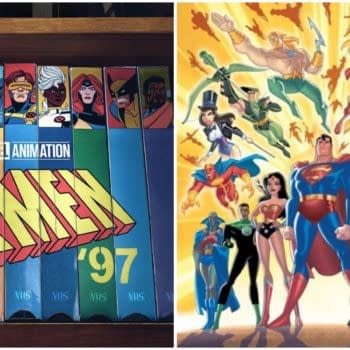Posted in: Movies, Recent Updates, Video Games | Tagged: DIY Gaming, dungeons & dragons, entertainment, Jack Shear, John Sholtis, Philip Jose Farmer, Planet Motherfucker, rpg, The Dungeon Dozens, Trey Causey, Weird Adventures
Self-Publishing Roundup: Three Fantasy RPG Supplements You Won't Find In Game Stores
By Christopher Helton
Tabletop roleplaying has always had a strong self-publishing/DIY streak to it. Even the massive industry leader Dungeons & Dragons started out as a booklet made by some guys who wanted to share the game that they had been playing. Today blogs and publishing sites like Lulu.com and RPGNow.com take the place of the photocopies and office supply raids of the self-publishers of old. In this, hopefully reoccurring, series I will explore the realms of self-publishing authors and the books that they have put out that you aren't going to see in your friendly local gaming stores.
Being in distribution and gaming stores isn't an automatic sign of quality, neither is making slick, full-color gaming books. Self-published doesn't have to mean low quality. In either mode of publication you get fascinating ideas that will explode your gaming like tiny little atom bombs.
One of the few things that these three books have in common are that they grew out of each of the author's blogs, which isn't an unusual route these days. Blogging is a great way to gain attention and discover an audience for your works. The blogs of each of these authors are similar in that they have a blend of free content and discussion of the things that inspire them and their gaming. You get a good look into the creative heads of designers when then blog (even semi-regularly).
Weird Adventures is the oldest of these three books, but it is one that I have suggested to friends and social media followers for a while. Ever since I was a kid and I first read Philip Jose Farmer's Doc Savage: His Apocalyptic Life, I have been hooked on the characters of the heroic pulps. I've even written a few games about them myself. With Weird Adventures you get a fantasy city inspired by the pulp magazines and 30s-40s pop culture. You get everything you would want out of a supplement about a city: a history of the city, important personalities of the setting and even some new monsters to throw at your player's characters. Grown out of the posts on the From The Sorcerer's Skull blog, Weird Adventures has taken on an organic life of its own, with the book and the blog supplementing one another.

While Trey Causey has written Weird Adventures as a supplement for old school Dungeon & Dragons and its various retro-clones, the way that it is written makes the book easy to adapt to any number of fantasy roleplaying games. Causey also speaks often about his influences in interviews and on social media. About why he self-publishes, Causey has said "I never really considered any other option. I don't get the sense that there are many RPG companies looking for pitches, at least not for products unrelated to their primary lines. In any case, other than saving me the cost of production, there wasn't a lot that going another route would have potentially gotten me, and it would have meant giving up a degree of control over the final product."
Jason Sholtis' book The Dungeon Dozens is a physical manifestation of that tabletop RPG gamer absolute: you never can have enough good random tables. The book is a collection of over two hundred random tables (some new and some originally available on his blog of the same name), all of which utilize a twelve-sided die. Also like with Causey, Sholtis' book and blog continue to support and augment each other.
One thing that sets Sholtis' book apart from the others is that he is also an artist. The cover and much of the interior art is by him and set the tone for the tables contained inside. Between the art and the tables you have page after page of gaming inspiration from this book. Sometimes, that inspiration can be just as important as a written out setting. The tables in The Dungeon Dozens are springboards, starting points for the design of a character or a campaign or a dungeon, little brainstorming sparks that can be turned into full-fledged worlds and characters. Sholtis' reasoning behind entering into the realms of self-publishing was simple: "By the time I stumbled upon the vibrant DIY D&D scene, self-publishing was already established as a standard means of putting your work out there. When readers of my blog began prodding me to collect my posts in book form, it was for me a no-brainer, the groundwork had already been laid."
Random tables are the start of a conversation in gaming rather than the end point. The idea behind them is to spur the imagination and cause a GM to think about things that they might not otherwise include in their games. Yes, a book of nothing but random tables can be basic, but a good book of random tables can give your characters interesting pieces of background that you might not have thought about, put interesting and weird little things in the otherwise empty corners of your dungeons and allow you to go into directions that might not have occurred to you before. The Dungeon Dozen is one of those books.
Just in flipping through the book and looking at the results of tables like "Puzzling Evidence in the Corner," "Outrages Attire of the City Folk," "Talents on Loan from the Gods: Divine Spells," "Dwellers in the Lightless Pits" and so many others makes me want to get out a pad of graph paper and start making a dungeon with which to torment my players. Is this a book that you are likely to see in a store, from a publisher? Probably not, but the sheer creative energy and inventiveness of the tables are why self-publishing is important to tabletop roleplaying. Just because a publisher wouldn't do a book like The Dungeon Dozens doesn't mean that it shouldn't have been done.
Lastly is Jack Shear's Planet Motherfucker. Definitely not family friendly, but sometimes you want to game with grownups who can handle a bit of mature content. And with a name like Planet Motherfucker, this supplement has mature content in spades. Like with the authors of the other two books, Shear's Planet Motherfucker grew out of posts on his blog.
Probably the most non-traditional of these three books, Shear's work grew out of the inspirations of the music of Rob Zombie, Rockabilly culture and late night psychotronic movies. Unlike the other two, whose works are geared towards a fantasy sensibility, Planet Motherfucker revels in its science fantasy apocalypse vibe. And, while mostly generic in its implementation, some of the specific write-ups in this book are for the Savage Worlds game from Pinnacle Entertainment Group. However, like with Causey's Weird Adventures, converting the contents to your system of choice would be fairly simple.
Against the sketched out post-apocalypse of the setting, you can play Living Dead Girls (or Teenage Frankensteins), Rat Finks, Murican Witches and other suitable psychotronic character types. The feel of the setting is Mad Max meets Hunter Thompson meets Bettie Page meets Rob Zombie in a big bundle of satire and seriousness that could probably only be found in a roleplaying game. Planet Motherfucker isn't going to be something that you find in a game store…if the name didn't make that apparent enough. It is also representative of the drive for self-publishing that you find in RPGs. Was this a setting that had to be made? Obviously Shear thought so, and I think that the tabletop gaming environment is richer for it existing. The satire and mature content won't be for every gaming group, but there is some powerful and fun stuff to be found under the DIY façade of this book.
Shear is also different in that he is the only of these authors who publishes his books at cost. This makes it easier to get some of his ideas into the hands of gamer who, even though they might not run a game called Planet Motherfucker, would take some of these ideas and integrate them into their existing games. That is really the core concept of being a game designer: getting your ideas out there where other gamers can start using them. Making money is just the gravy on top of that, for some. Shear summed up his reasons for self-publishing as "I self-publish because, for me, the "business" side of gaming makes the "hobby" side of gaming less fun. I never want to be thinking about "what will sell," "what will be popular," or "how can I maximize my profits from this Kickstarter." (This is also why I make all my game books available as free PDFs; I think it's more valuable for gaming as a whole to have hobbyists putting their ideas out there than it is to see gaming as a place to make a few extra bucks and court small-pond popularity.)
Self-publishing is ideal for me because I can put my dumb game ideas out there and people can do whatever they want with them. If people find a use for them, that's great! If not, well, I haven't wasted a publishers time and money and hopefully I've lowered the bar enough that no one feels like they aren't qualified to put their gaming content out there for other people to use and be inspired by. So far, it's worked; there are currently games using my published material going on across multiple continents, and people have done hacks of my campaign settings that I would have never anticipated. That blows my mind."
One of the great things is seeing these self-publishing efforts making their way into gaming. I have seen people using Causey's Weird Adventures as the setting for their games in a number of different systems, Shear's Planet Motherfucker as well. The creativity of the works by these three authors spreads out into the larger community of gamers through blogs, through actual play videos on YouTube and through the enthusiasm of other gamers on social media sites. Each of these is a book that you should see in your local gaming store, but now you can fix that. Click the links to the products, follow the blogs and see what the people have to say online. There are worlds out there that are waiting for you, that you would have missed out on otherwise. Your gaming will be all the better for having checked out these things.
Christopher Helton is a blogger, podcaster and tabletop RPG publisher who talks about games and other forms of geekery at the long-running Dorkland! blog. He is also the co-publisher at the ENnie Award winning Battlefield Press, Inc. You can find him on Twitter at @dorkland and on G+ at https://plus.google.com/+ChristopherHelton/ where he will talk your ear off about gaming and comics.

















